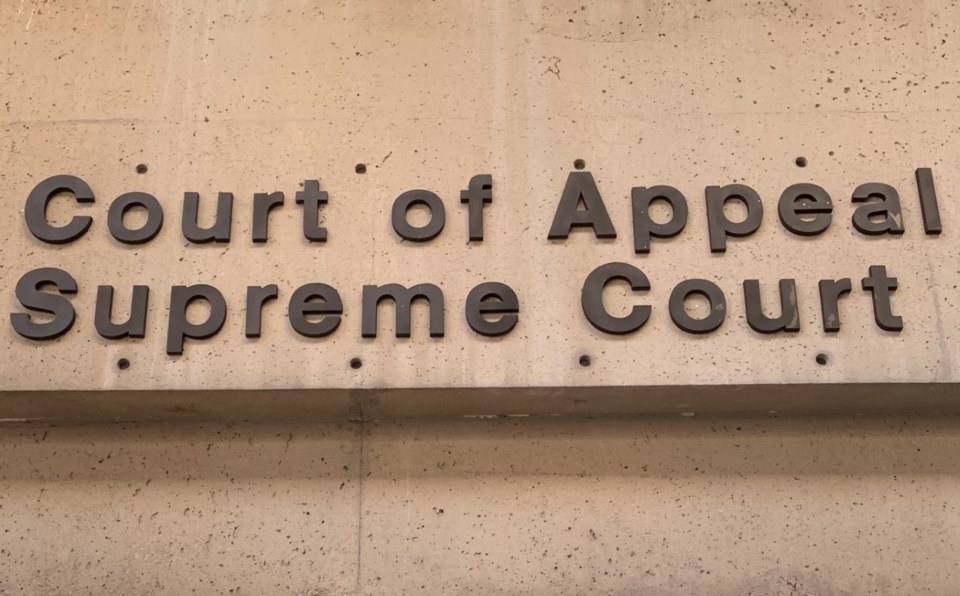B.C.’s top court has rejected a man’s appeal of a conviction for assault, kidnapping, extortion and choking in a drug-related case where two other men were also found guilty.
In July 2020, a B.C. Supreme Court judge convicted appellant Robert Lowry and two co-accused — Neil and Stephan Cantrill — of aggravated assault, kidnapping, extortion, and choking to overcome resistance.
All three accused were also found guilty of unlawful confinement, but that count was conditionally stayed.
The August 2016 Chilliwack offences arose out of the confinement and beating of Richard Houle. It was motivated by an alleged drug debt, B.C. Court of Appeal Justice James Fitch said in the unanimous, three-judge Feb. 13 decision.
Fitch said Neil Cantrill knew Houle at the time of the offences, and that the two men had a lengthy history of drug dealing.
Houle identified Neil Cantrill in court as one of the three men who attacked him. Prior the offences, Houle had not met Stephan Cantrill or a third man who participated in the assault. He was introduced to both by Neil Cantrill just before the offences.
Fitch said Houle recalled that Neil Cantrill introduced the second man as his son, Stephan, but could not recall the name of the third man.
“He was not asked to identify either of the other two assailants at trial,” Fitch said.
Lowry’s main avenue of appeal was that of identity. Lowry asserted on appeal that the trial judge reversed the burden of proof on the issue of identity; he claimed the judge erred in relying on evidence that blood associated with the victim was found on jeans the appellant was wearing at the time of the offences.
He suggested the blood could have come from contamination with other exhibits where Houle’s blood was present. That suggestion was rejected as the jeans were bagged.
The crime
Fitch said Neil Cantrill invited Houle to meet him on a highway pullout. The former attended with Stephan Cantrill and a third man alleged by the Crown to be the appellant.
The judge said things almost immediately turned violent after Neil Cantrill said to Houle, “So, you think you can rip me off?”
Houle testified that Neil Cantrill grabbed him by the throat as he said this, and that the third man punched him on the right side of his face. The blow knocked Houle’s glasses off and caused him to bleed profusely, court heard.
“The third man then applied a chokehold to Houle that nearly rendered him unconscious,” Fitch said.
Houle was then directed to an SUV’s rear seat, which drove off with the other three men in it.
“Houle testified that he was assaulted and/or burned by all three assailants while in the SUV,” Fitch said. “He testified that the third man repeatedly punched him on the right side of his face, which caused further bleeding.”
Meanwhile, police had received a call from a person who had seen the pullout assault.
Houle was taken to his Johnson Road residence where he was threatened and told he would have to transfer title to the house to his attackers to pay off an alleged drug debt.
About that time, police received another call, this time from Houle’s neighbour, advising them of suspicious activity at the home.
Officers arrived shortly after and arrested the Cantrills and a man who identified himself as Robert Lowry. They noted a tattoo on his left arm.
Identification
“It is apparent that the appellant has a tattoo on his left arm,” Fitch said.
“The investigating officers did not notice any injuries to the appellant at the scene nor did they notice any blood on his dark blue jeans,” Fitch said. “There was abundant evidence confirming Houle’s description of the assault, including blood at the scene, in the rear of the SUV, and in his house.”
Houle suffered severe facial wounds in the assault, including the fracturing of his right eye orbital bone.
Jeans seized from Lowry were analyzed and the blood was identified as Houle’s.
The trial judge found there was no evidence of blood contamination on the jeans.
“That Houle’s blood was found on jeans the appellant was wearing when he was arrested was powerful evidence implicating the appellant in the attack and confirming his identity as the third assailant,” Fitch said.
As such, he rejected the contamination idea.
“The judge was entitled to find as a fact there was no evidence of contamination and that the presence of Houle’s blood on the appellant’s jeans was powerful evidence establishing his identity as the third man involved in the assault,” Fitch said.
As for the identification, the court noted Houle had given a partial identification but added he was being assaulted and had his glasses knocked off.


